#Jill Paton Walsh
Note
Happy Easter! I apologise if you have answered this previously: But what are your thoughts on the Jill Paton Walsh Lord Peter novels? Hope you are well. Take care and stay safe. xx
Happy Easter! I never mind answering this question; I just always feel vague compunction for being resentfully indifferent to these novels. I've read... 3 of them? I think? And they were... fine. (More detailed thoughts here and here.) The JPW continuations are competently crafted but I do not find them intellectually interesting, and this, where Dorothy L. Sayers is concerned, might be the sin against the Holy Ghost. I've read fanfic that I think is more genuinely experimental and transgressive (e.g. that of @huntercombe) and that is more insistently, creatively occupied with the practical and philosophical management of the Wimsey-Vane marriage (e.g. that of @rain-sleet-snow.) I hope you're well too!
26 notes
·
View notes
Text
All I’m saying is that Harriet and Peter Wimsey would both be young enough still in the mid-late 60s to visit Oxford, possibly for another Shrewsbury College reunion, or indeed one at Balliol/Bailey, or something to do with one of their kids. And might even have one or more of the rest of their friends in tow, I mean even if Bunter’s retired by then he (and Jill Paton Walsh-continuations spoiler-character!) would still be living with or near the Wimseys. And Charles and Mary Parker also very happily go anywhere Harriet and Peter are as we know. :D
And then inevitably there might be a murder, which leads to the glorious possibility of them all being interviewed as witnesses by DI Thursday, DS Jakes, and DC Morse, and then Peter trying to investigate it himself anyway and at least one of the Endeavour characters turning out to be massive Harriet Vane fans and and and...
*sighs* So many plotbunnies, so few spoons to actually get any writing done. So if any fellow fans of both Endeavour and Dorothy L Sayers (and ideally the Jill Paton Walsh continuations! my thinking is that it would be great if it agreed canonically with The Attenbury Emeralds especially...) want to write this before I get around to it, please please *please* be my guest. :D
#itv endeavour#lord peter wimsey#dorothy l sayers#dorothy l. sayers#fic prompt#ridiculous crossover time#jill paton walsh
39 notes
·
View notes
Text
I genuinely don't know if there's enough of a Dorothy Sayers fandom on Tumblr for this post, but I'm going to put it out into the universe and see what happens.
It just seems wild to me that Jill Paton Walsh was allegedly such a huge Dorothy Sayers fan that the estate let her not only finish Sayers' unfinished manuscript (Thrones, Dominations), but also write several more Peter and Harriet books...and yet in her A Presumption of Death she makes two mistakes in canon that are both established in Busman's Honeymoon.
1. Sayers referred to Mr. Puffett to as a widower, and it's mentioned that he lives with his daughter Ginny and her husband (this is mentioned again in the post-war short story "Talboys," so it's not like he could have gotten married after the events of BH). But Paton Walsh includes a character called Mrs. Puffett: she only says one line during the air raid, and another character follows up by referring to her as "Ma Puffett," with no other explanation as to who she is.
2. In Busman's Honeymoon, Mrs. Ruddle aggressively says that she's "chapel," which the internet tells me means Methodist. Yet in Paton Walsh's book, Mrs. Ruddle makes disparaging comments about the Methodists while in the basement of the Crown during the trial air raid (it's stated that the Methodists refuse to go to a pub even for an air raid shelter, so they make their own shelter elsewhere).
If there's some explanation of these, I'd love to hear it. But she also changed a reference to "Denver" in a Sayers-penned letter from the Dowager Duchess to an old friend to "my oldest son, the Duke of Denver" (as if her friend wouldn't know who she meant), so I don't think one can exactly say her writing was flawless.
10 notes
·
View notes
Text
I was putting my Lord Peter Wimsey books back in the correct order after the bookshelf rearrangement (using this very helpful post because none of these publishers think to give chronological lists inside the covers), when I noticed something odd.
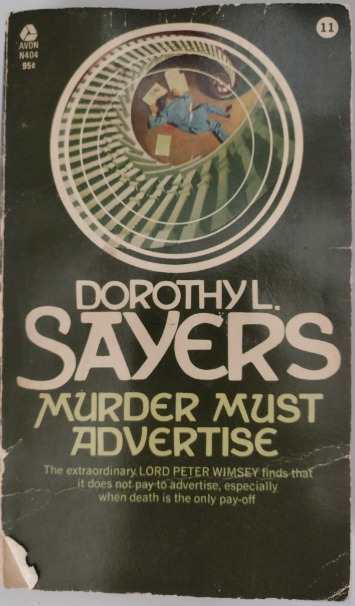
Murder Must Advertise is identified as #11 in the series, but it should be #8. There are only #11 novels in the series*, so I’m wondering if they published the short stories in shorter collections and then interspersed them in between the novels? That’s the only thing that makes sense to me but I’m also thrown by the idea that you would organise and number a series with collections of short stories between the novels.
Does anyone who either has other books in this edition or know more about the short story collections want to weigh in?
#Lord Peter Wimsey#Dorothy L. Sayers#*at least at the time this would've been published#I really don't know how people count the completions much less the continuations by Jill Paton Walsh#And I don't think I want to know if there's drama#Thanks in advance to anyone who has any thoughts; got an inkling *someone* will know#Also if anyone actually looks at the linked post and reads the tags - nothing has changed on that front
12 notes
·
View notes
Note
Help, I’ve fallen passionately and devotedly in love with Lord Peter Wimsey. What am I to do?!
Well, I hear it’s not a condition that can be cured, but it can be managed?
1. Read - after you’ve done the novels and short stories, Wimsey Papers etc, have you had a look at DLS’ other writings? If you like his voice, I guess you could say you like her voice as well and she does write a good essay. (Of course there’s always the ‘follow-on’ novels by Jill Paton Walsh but tbh they’re not for me, so I have no review to provide!)
2. Watch/listen - the Petherbridge/Walter TV adaptations are generally held to be delightful, in that 80s BBC sort of way. Other earlier filmed Wimseys are around but can be hard to find! Audiobooks and BBC/Radio 4 radio adaptations (which were released on hard copy at one point) also appear here and there, although I’ve not experienced all of those myself yet.
3. Get involved - there’s a treasured little Sayers fandom here on tumblr, and all the high holidays are observed (April Fools, various anniversaries), so trawl the tag and find some delightful people. I confess I’m not generating all that much Wimsey content myself at the moment, but my follow list strews posts about campanology and John Donne across my dash like spring blossoms with reassuring frequency.
4. Enjoy, and welcome!
#replies#fromthedeskofcripslock#dorothy l sayers#sound off sayers hive: recommendations? commiserations?
75 notes
·
View notes
Note
i'm reading all the peter wimsey novels because someone recommended gaudy night and that's how i work, and now i'm up to the nine tailors and just finished murder must advertise (my favorite so far), but i found it really hard to get through have his carcase, which was odd since i loved harriet vane so much in strong poison. even the characters seemed to bugger off at the end of have his carcase instead of tying up all the storylines and sayers seemed disengaged after the first act or two. i liked the parts with peter and harriet, even the two chapters that are 99% cipher, but everything else felt weak. did you enjoy this one/why or why not? do you have a favorite of the wimsey novels other than gaudy night?
I may be inducing a fight by saying this but I think Have His Carcase is one of Sayers' weakest novels, and certainly the weakest of those featuring Harriet Vane. I tried to re-read it recently and couldn't get very far into it, and I'm a huge fan of Sayers. I think it's also a necessary book in order to create a complete story for them -- but I don't know that it's necessary to read it in the modern era, and certainly not necessary to re-read it.
(My other picks for least enjoyable: Five Red Herrings and Nine Tailors, both of which are visibly her attempts to write like Agatha Christie, one of her literary heroes -- and they're not bad books, I just don't like Agatha Christie style "clockwork" mysteries, which tend to sacrifice personality to logistics. I suspect this may have impacted Carcase somewhat. We will come back to this.)
Gaudy Night is actually not my favorite overall -- I think it's one of her best, but Murder Must Advertise is my favorite and in fact the first one I read. Which is hilarious because Peter spends a significant amount of time Not Being Peter Wimsey in it, but it's just such a combination of things I love. Advertising (which Sayers worked in and which she also clearly loved writing about), secret identities, crime rings, a hint of romance, office gossip...
Anyway, Carcase. I think the problem is that to get from Strong Poison to Gaudy Night, there has to be a bridge, and it has to be kind of an unpleasant one, and thus you get Have His Carcase. One of the major points of Harriet's arc is that Sayers wanted to contravene the "damsel rescued by the hero" narrative. Not so much because she believed women should save themselves or not, but because she believed that a relationship based on that kind of inequality, where one partner was grateful (or was expected to be grateful eternally) for being saved, was inherently unhealthy and unsustainable, and it was also a super common narrative at the time she was writing. This reaction to the narrative is most visible in her unfinished novel Thrones, Dominations -- which was finished after her death by Jill Paton Walsh, and I'm not a huge fan of the end product, but I've seen the original manuscript held at Wheaton and it's evident that this was a theme before anyone else took over, it wasn't forced into the plot.
In any case, Sayers had to get Harriet and Peter from victim and rescuer to equal footing, and while Gaudy does a lot of lifting in that regard, it doesn't do enough on its own, there had to be a previous groundwork laid. In a sense I'm glad that the grappling they have to do, which is sensible and intelligently written but also really unromantic, was done in Have His Carcase, so that it doesn't intrude more than briefly into Gaudy Night. Carcase is a lot about Harriet setting boundaries and testing whether Peter will cross them, and Peter reacting (sometimes poorly) to someone challenging him in ways he's unaccustomed to being challenged. Carcase is two people finding out the worst parts of each other so they can work out that they love the reality of each other anyways, which is what they're doing in Gaudy. But we have to witness it in Carcase, which is unpleasant. At least for me.
As she matures as an author and gains more power over how she's published, you can see Sayers trying new things -- after Bellona (another fave) she gets very literary with Strong Poison, and then seems to swing between these kind of torturous attempts at Christie's style (Herrings, Tailors) and incredibly sensitive, emotionally delicate books like Murder Must Advertise and Gaudy Night. Carcase is a weird combination of the two, where she seems to be applying the dispassionate Christie style to a book that wants to be Gaudy Night but can't be.
Anyway, even her less enjoyable books can still be pretty fun, and it's worth it to have books like Murder Must Advertise and Strong Poison, and the thrilling romance of Gaudy Night. But yeah, Carcase is a bit of a slog to get through.
145 notes
·
View notes
Text
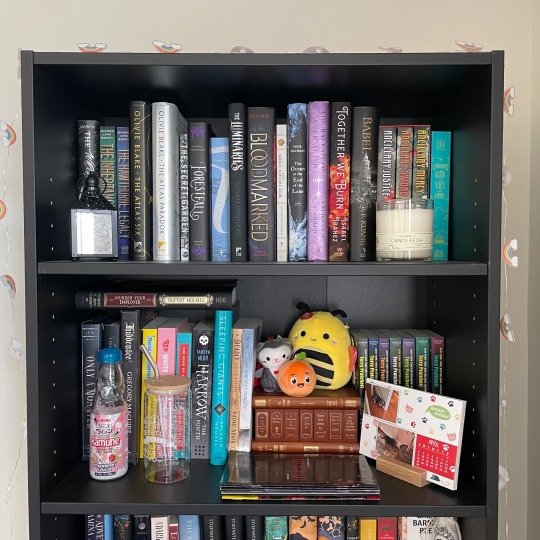
Hypothetically, you are only able to keep 20 of your books. Only one book per author/series. So what books are you keeping?
Oooh!! Thanks for tagging me @fluencylevelfrench ! This is so hard omg… okay here we go:
The color of magic by Terry Pratchett
Tigerlily by Jodi Lynn Anderson
The 7 1/2 Deaths of Evelyn Hardcastle by Stuart Turton
Uprooted by Naomi Novik
The Council of Mirrors by Michael Buckley
The Anthropocene Reviewed by John Green
American Gods by Noel Gaiman
Hamlet by William Shakespeare
The Green Book by Jill Paton Walsh
The Dorito Effect by Mark Schatzker
Other Minds by Peter Godfrey-Smith
Refuse by Julian Randall
The Utterly Uninteresting and Unadventurous Tales of Fred, the Vampire Accountant by Drew Hayes
The Hitchhikers Guide to the Galaxy by Douglas Adams
The Princess Bride by William Goldman
The Shell Seekers by Rosamunde Pilcher
Eurydice by Sarah Ruhl
Where the Mountain Meets the Moon by Grace Lin
And Then There Were None by Agatha Christie
The Whale Rider by Witi Ihimaera
I tag @bennistudies @alexistudies and anyone else who wants to do it!!
33 notes
·
View notes
Photo
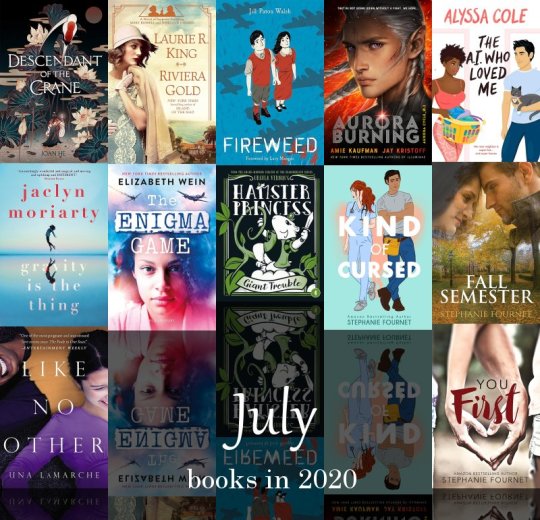
Books read in July
With one or two exceptions, these were books were sources of FEELINGS.
Favourite cover: The Enigma Game, nut most of these covers are a good fit for the stories they represent.
Reread: “The Marriage of Mary Russell” by Laurie R. King, “Something Worth Doing” by Elizabeth and I also listened to quite a bit of Code Name Verity (by the same).
Also read: “Monster” by Naomi Kritzer.
Still reading: A Wizard’s Guide to Defensive Baking by T. Kingfisher.
Next up: Stars Above by Marissa Meyer.
(Longer reviews on LibraryThing and Dreamwidth.)
*
Descendant of the Crane by Joan He (narrated by Nancy Wu): Princess Hesina of Yan, believing her father to be murdered, opens an investigation into his death. She’s driven by her aching grief and by her fierce desire for truth and justice -- for all her people, as well as in this matter of her father’s death. But the truth is much harder than she expects. I thought this was incredible, but sometimes stressful! Compelling characters, complex family dynamics (I especially liked the sibling relationships), intricate prose and worldbuilding, and startling twists that turned out to slot neatly in with the other puzzle pieces.
Riviera Gold by Laurie R. King: This takes place in July 1925, immediately after Island of the Mad. Mary Russell leaves Venice for Monaco, hoping to see her former housekeeper -- and discovers that Mrs Hudson has been accused of murder. As always, I love Russell's first person narration and her observations of the world around her. The historical scenery is particularly vivid: cliffs and ocean views, the Monte Carlo casino, expats with questionable pasts and connections, smugglers, Jazz Age artists, bronze casting. Moreover, it’s all relevant to the mystery Russell is unravelling. I also liked the indications that Russell and Holmes’ unconventional marriage works for them.
Fireweed by Jill Paton Walsh: A short bittersweet novel from 1969 about two runaway evacuees living on the streets of London during the Blitz. It’s very vivid, particularly the details about wartime London -- but there’s also a thread of ambiguity, because the narrator is looking back on a time he doesn’t fully remember and didn’t always understand. In the end, that becomes a bit unsatisfying, yet I like how the story allows one to fill in some of the gaps for oneself. I wish I had discovered this at thirteen -- I’d have appreciated it even more and been fascinated by the experience of fending for oneself.
Aurora Burning by Amie Kaufman and Jay Kristoff: After everything that happened in Aurora Rising, Squad 312 have been labelled traitors but they are not going to let that stop them from saving the world. This is fast-paced, with some excellent twists and frustrating developments. Sometimes the action was engaging; other times my eyes glazed over. Sometimes the multiple POV was a strength; other times I felt it hindered me from becoming really attached to anyone. Sometimes I was amused by the characters, and other times the qualities which make them amusing became irritating. I think the things I liked outweighed the things I didn’t care for?
The A.I. Who Loved Me by Alyssa Cole: Trinity is working from home after a traumatic accident when she meets her neighbour’s strange nephew, Li Wei. This science-fiction romance has mystery, humour and moments of very pointed commentary. I enjoyed Li Wei working out how to act like a human again, and the interactions with Penny, the Home AI assistant. There is more going on here than either Trinity or Li Wei initially realises, which is great --- but that reveal indicates that some important, interesting parts of this story have been glossed over. I might have liked this more if the flashbacks had been expanded.
“Monster” by Naomi Kritzer (from Clarkesworld Magazine, issue 160): This alternates between Cecily’s time in China, looking for an old school friend, and the history of that particular friendship. I don’t regret reading (well, listening to) this, but I don’t know if I liked it. It is tense and uneasy, and left me wishing I had someone with whom I could discuss interpretations of the ending’s implications.
Gravity is the Thing by Jaclyn Moriarty (narrated by Aimee Horne): This grew on me. In the end, I loved it. For twenty years, Abigail’s been sent chapters of a mysterious self-help book. The story alternates between the present, as Abigail learns more about The Guidebook, and her reflections about her past -- particularly her brother, her marriage, being a single mother. At times this story is uncomfortable but the way everything is drawn together -- and seeing Abigail make sense of her life -- was unexpectedly satisfying. Compelling. I also liked the Australian setting, the Aussie audiobook narrator, some of the whimsical parts and how Maybe The Real Treasure Was the Friends We Made Along the Way.
The Enigma Game by Elizabeth Wein: Like The Pearl Thief, this is a prequel/companion novel to Code Name Verity. In late 1940, nineteen year old Jamie is an RAF pilot in northern Scotland. His friend Ellen, a driver for the aerodrome, is staying at the same pub as Louisa (newly-orphaned, half-Jamaican), who is caring for an elderly German woman. Together they discover a way to keep Jamie’s squadron ahead of the Germans. I loved this. A powerful exploration of identity, secrets and the problems of prejudice. I was delighted (and also devastated) by how this story fits in with Code Name Verity. The bits about flying are lovely.
Hamster Princess: Giant Trouble by Ursula Vernon (aka T. Kingfisher): After Ratpunzel, Harriet’s next adventure involves magic beans, a giant bunny and a hamster who wants to form a band.
There is something very soothing about making tea. You have to concentrate on the whole process, and then you have tea. Even someone as decisive as Harriet had to make tea sometimes and think things through.
Kind of Cursed by Stephanie Fournet: Millie has been dealing with a lot -- losing her parents, gaining guardianship of her younger siblings, a miscarriage and a relationship break-up. She’s decided to avoid men for the next decade. But it’s hard to avoid Luc, who is overseeing the renovation of Millie’s kitchen. Watching Millie find the support, comfort and happiness she so desperately needs gave me warm fuzzy feelings. This has the right I-need-a-hug-vibe, the right ratio of emotional hurt/comfort, for me. In another story, I might have had issues with how quickly the romance becomes a serious relationship, but the characters’ choices made sense in context.
Fall Semester by Stephanie Fournet: This romance between a depressed literature professor and a graduate student with a terminally-ill father was an interesting experience because I was aware of its weaknesses and yet it was such a compelling dose of FEELINGS that I really enjoyed reading it. I also have something of a soft spot for stories about universities -- and perhaps was feeling tolerant, knowing it was the author’s first novel. (Weaknesses included: the prose style is serviceable but bland, an odd fit for protagonists with backgrounds in literature/poetry; their serious issues deserved more focus; and some of Malcolm’s reactions have uncomfortable overtones of entitlement.)
You First by Stephanie Fournet: More compelling feelings, which kept me reading, but in hindsight, didn’t completely sell me on the age-gap or the short time-frame. If only it hadn’t largely skipped over showing the characters navigating an interesting challenge introduced in the final act in favour of an epilogue which picks up some time later! Seriously, if you’re going to throw in that particular complication, then I at least want to watch them deal with it. I’m not grumbling too much. I cared enough about seeing the characters’ situations improve, which counts for something. And what did I expect, reading three romance novels in a row?
Like No Other by Una LaMarche: Two teenagers meet in a New York hospital elevator during a blackout. Devorah is a Hasidic Jew, Jaxon is black. Devorah is not allowed to socialise with boys outside of her family, let alone anyone outside her community, but she and Jaxon keep finding ways to see each other. This was fascinating, but also frustrating -- I was frustrated with Devorah’s culture for making her feel like she would be disowned if she put a foot wrong, and also frustrated, perhaps unfairly, with Jaxon for not fully appreciating the risks Devorah faces. However I liked the ending a lot.
#Herenya reviews books#Joan He#Laurie R. King#Jill Paton Walsh#Amie Kaufman#Jaclyn Moriarty#Elizabeth Wein#Ursula Vernon#Stephanie Fournet#Una LaMarche
1 note
·
View note
Text
Krimis-kemény csajos update - a 152. epizód
Krimis-kemény csajos update – a 152. epizód
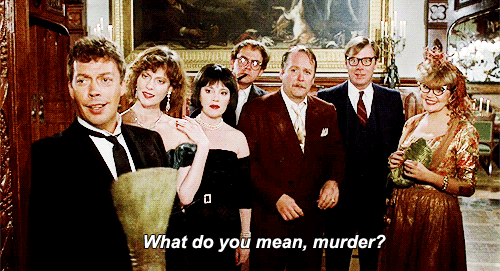
Mivel mindketten meglehetősen kitartó krimirajongók vagyunk, jó pár korábbi adásunkban beszélgettünk már az éppen aktuális olvasmányélményeinkről és örök kedvencekről ebben a műfajban. Az elmúlt néhány hónap olvasmányaiból most is összegyűlt egy kisebb tematikus lista, így mai adásunkban újra arról beszélgettünk, milyen érdekes női nyomozókkal vagy egyéb kemény csajokkal találkoztunk a…
View On WordPress
#angela marsons#bletchley circle#dorothy l sayers#elizabeth wein#emma healey#j. d. robb#jill paton walsh#kate quinn#kendra elliot#krimi#linda castillo#nora roberts#patricia gibney#podcast#robin stevens#sarah rose
2 notes
·
View notes
Photo

Book review: The Attenbury Emeralds by Jill Paton Walsh The Attenbury Emeralds by Jill Paton Walsh My rating: 4 of 5 stars I love the Lord Peter Wimsey mysteries written by Dorothy Sayers.
0 notes
Note
What do you think of J. Paton Walsh's continuations of the Wimsey series? With how weary and jaundiced an eye ought they to be regarded?
Hail, fellow Sayersite! I’ve provided one reply concerning the Walsh Wimsey pastiches here, a reply which omits another of the JPW novels because I had entirely forgotten it at the time. It takes place partially at Oxford and is the least successful of the ones I’ve read, being (I thought) heavy-handed.
Regard them with the resigned weariness of a 19th-century roué contemplating yet another season. I always feel a faint twinge of guilt, dismissing them so remorselessly, even if it is done more in sorrow than in anger. I’ve found Walsh’s other work entertaining – readable, clever, and engaging. And I am quite sure that I would enjoy these much more if they were period-set mystery novels featuring some other cast of characters, less distinctive and less beloved. And perhaps the root of my dissatisfaction with them is that they rather feel like that. I just don’t feel that they capture either the effervescence or the erudition of the originals, both qualities impossible to counterfeit.
#the gaud squad#wimseyverse#jill paton walsh#dorothy l. sayers#my detection obsession#asks and answers
9 notes
·
View notes
Text
I always forget precisely how much Jill Paton Walsh was a Lord Peter Wimsey multishipper until I relisten to the talking book of The Attenbury Emeralds.
Her Harriet/Peter? superlative and beautiful and warm and sexy and glorious, absolutely lives up to what Sayers created
Bunter/Hope? delightful, a lovely JPW-canonical pairing for Bunter, approve so much
Peter/Bunter? everywhere, and tender and moving and unspoken, with Harriet and Hope massively shipping it.
Harriet/Hope? not *not* there, for sure
Harriet/Peter/Bunter/Hope? honestly, not too far from being canon
Parker/Mary? oh yes, they’ve still got it, Parker’s still a parfait knight, love them
Peter/Parker (aka the Spiderman ship ;-) )? off the scale implications, glorious; contains a completely gratuitous neck-touching scene, and a theology-related meet-cute in the flashback; Peter and Mary are clearly managing to be siblings who are also metamours just fine; Harriet clearly adores it all too
Also JPW seems to have a lot of interest in characters that Sayers, dearly as I love her, had got a bit bored of. Like when Eiluned and Sylvia the glorious (and pretty definitely canonical) lesbian couple from Strong Poison turn up in Thrones, Dominations. And the fact that Freddie keeps turning up and being a darling and a bunny-ears lawyer (well, bunny-ears finance expert). :)
In short: hooray. :D
#dorothy l sayers#dorothy l. sayers#lord peter wimsey#jill paton walsh#harriet vane#mervyn bunter#hope bunter#charles parker#mary wimsey#peter wimsey#the attenbury emeralds
22 notes
·
View notes
Photo
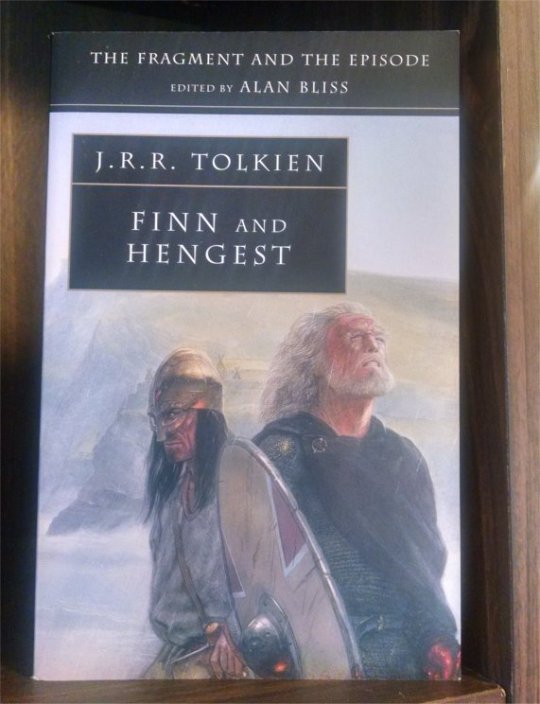
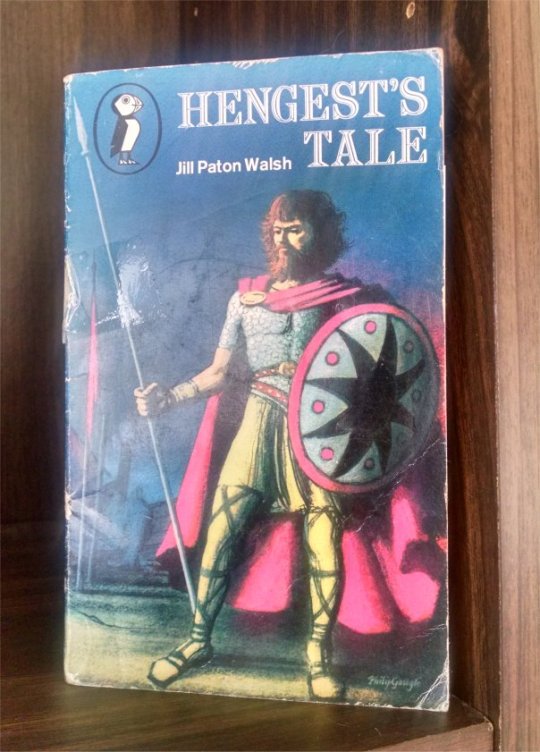
Just One Word 03/14/2017: RETELLING - Prof Tom Shippey, one of my great heroes, likes to talk about this YA book as a good way to understand Tolkien’s interpretation of the Finnesburg story, much easier that working one’s way through Alan Bliss’s edition of Tolkien’s lectures.
#books#just one word book photo challenge#just one more page#more tolkien related books#i have many#i thought about doing this challenge with tolkien-related books only#also#how can i work another reference to tas into this challenge?#jrr tolkien#finn and hengest#jill paton walsh#hengest's tale#tom shippey
5 notes
·
View notes
Text
Farewell, Great King
I have never been very into historical fiction, so I was quite surprised by how much I loved Farewell, Great King by Jill Paton Walsh when a friend lent it to me a few weeks ago. I read it in two nights- the first time in many years I’d had a book I couldn’t put down and was apparently so engrossed that I only today realized that I’d snapped a picture of my favorite passage from that tale of Themistokles’s life:
The oldest man, wearing a ring of office, said to me, “Who are you, coming from a far country?”
“I am Themistokles, the Athenian,” I said, “Who are you?”
“We are the Eretrians,” he said, “And when we were taken from our homes, Themistokles, you did not come.”
“We could not,” I told him, but my voice shook a little, “...There were not enough ships ... as soon as the gods gave me the opportunity,” I said to their blank faces, “I made sure the Athenians had ships enough for all needs.”
The old man raised his red-rimmed eyes to look at me. “Nobody has set eyes on a ship these twenty years,” he said. “The children do not know what they are.”
Reading Herodotus, the fate of the Eretrians is lost among the hundreds of other Persian or Greek atrocities. They’re forced from their homes, marched a world away in chains, and vanish from his pages as completely as they vanished from the world they knew. Walsh understood the awfulness of that at a more visceral level than I ever would have and although Themistokles’s chance encounter with them during his own exile in Persia is entirely fictitious, it made their suffering realer to me than the historical account ever did.
5 notes
·
View notes
Photo
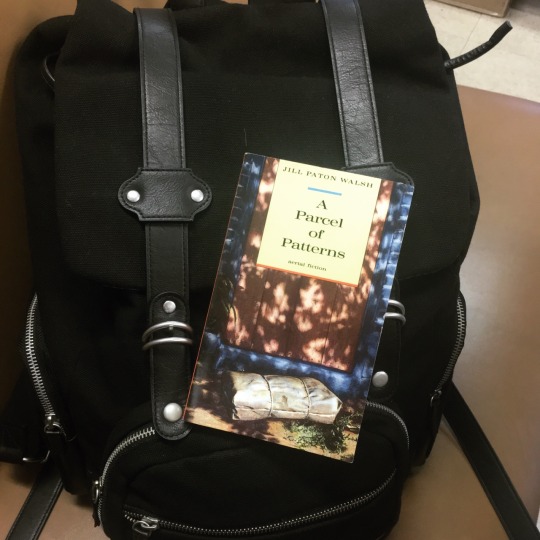
MICRO REVIEW: A Parcel of Patterns
This round’s prompt: a book you’ve reread & how you as a reader have changed with time
- Join in even if you haven’t been tagged
- Answer as elaborately as you want!
- Tag friends to make their own micro reviews
- Optional: use “#library of micro reviews” to be reblogged by thelibraryofmars on Mondays thru Jan/Feb
1. Title and author: A Parcel of Patterns by Jill Paton Walsh
2. When did you first read this book? I read it several times when I was young, first as a school assignment and then on my own volition. It was kind of my go-to sad book.
3. What made you want to reread it? I’m very interested in plagues and epidemics (which honestly this book probably helped to spark) so I was really curious to see if it held up.
4. Since first reading it, have you changed? Did this make you notice new things? I know a lot more about the Black Plague and the town of Eyam, so I could tell that this was well researched. It did seem a heck of a lot shorter now that I regularly read books more in the 400-600 page range, but that brevity was nice too.
5. Ultimately, did your opinion of the book change? Nope! My young impressions were spot on and I still think this book is extremely well done. It’s nice to not have nostalgia ruined. :)
What have y'all reread? Make a micro review! @classybookunicorn @elvencantation @anassarhenisch @coffeebooksandaliens @acanadianbibliophile @booksforthoughts @brideofsevenless
[More about micro reviews here!]
#library of micro reviews#books#booklr#a parcel of patterns#jill paton walsh#plague project#historical fiction#mine#melanie reads books
22 notes
·
View notes
Text
I have not only found my copy of Gaudy Night but the “follow-up”, The Late Scholar (written by Jill Paton Walsh, who did other continuations of the Wimsey series that I am interested in trying to get now) and I also got most of the books on my sofa onto a bookshelf, and identified several for purging.
My sofa gets one step closer to being usable and not just the repository for various odds-and-ends in transit to their final destinations (including my glass-topped coffee table which I need to figure out where to place, and whether I may need to shift my tv stand and living room bookshelf and sofa, something I am not looking forward to).
4 notes
·
View notes